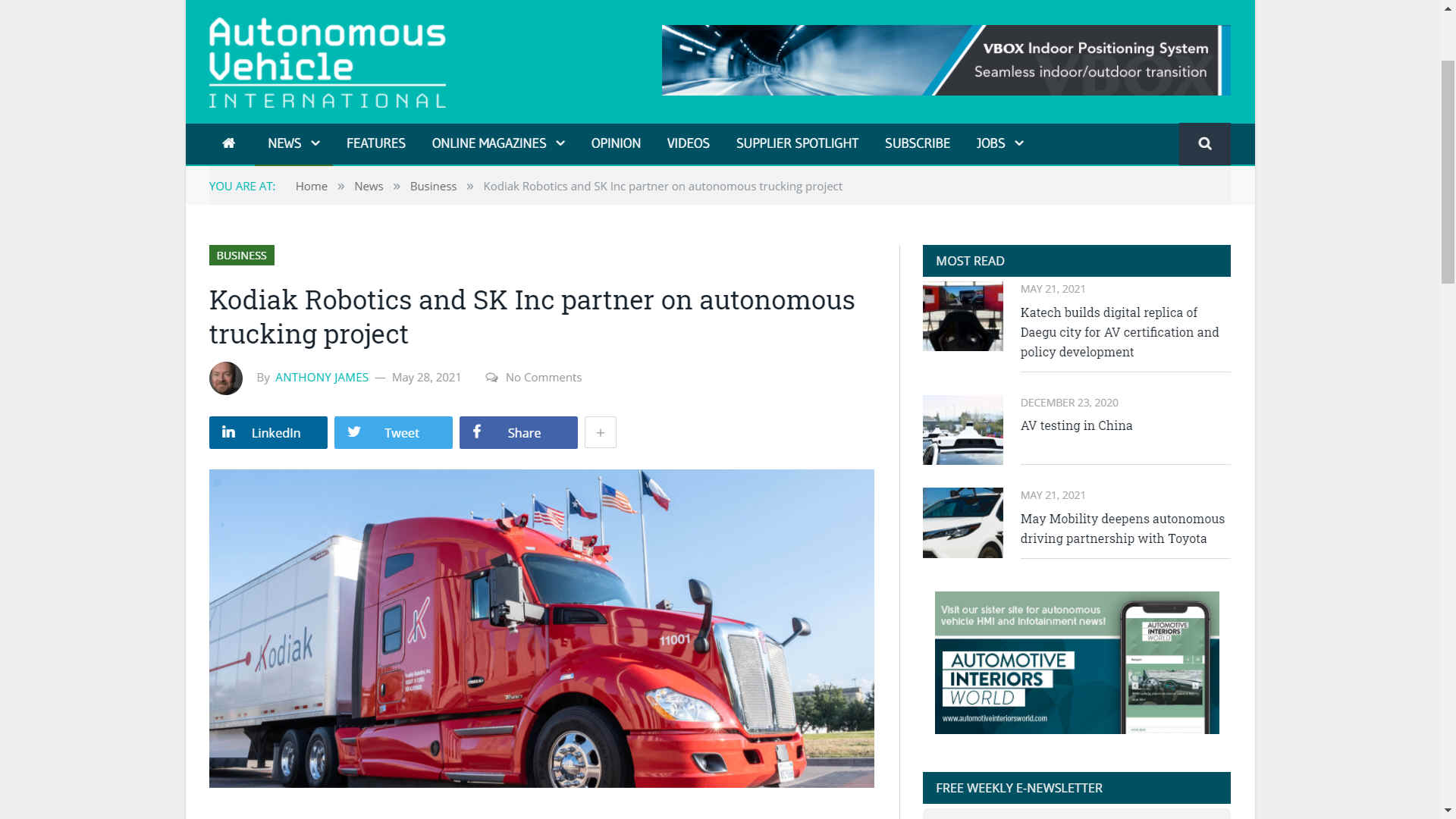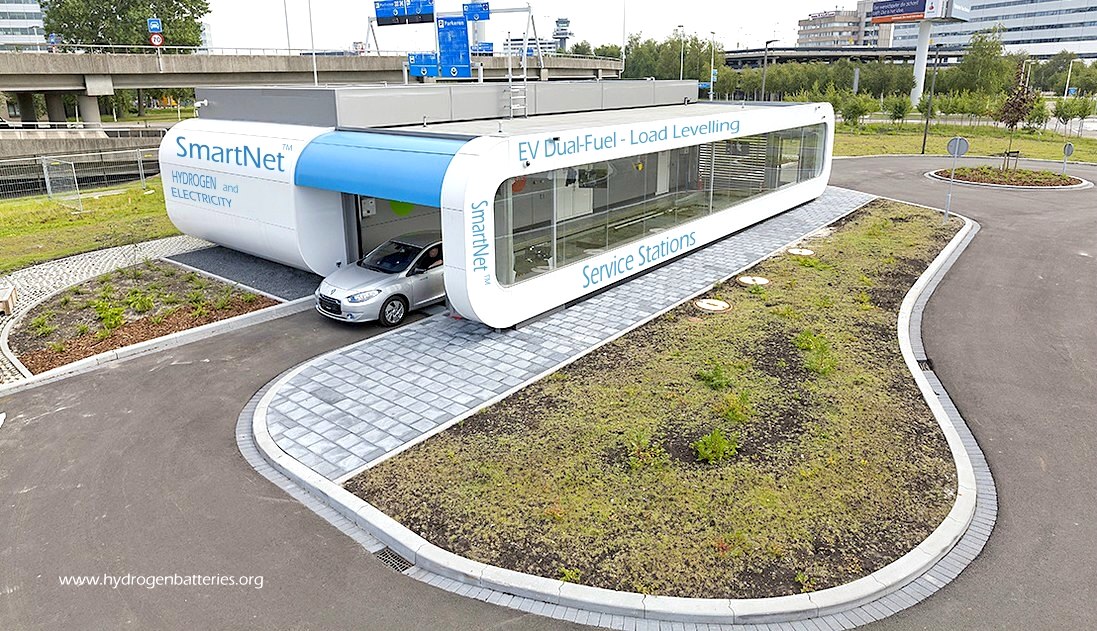|

KODIAK
ROBOTICS - Self driving trucks for freeway haulage logistics is all the
rage at the moment for investors looking for the latest digital gold rush.
Kodiak joins Waymo, Aurora,
TuSimple
and AutoX
as they look for the elusive holy grail of AI on the road, somewhat blowing
wildcard Tesla
into the weeds. You can read more about these companies and the media
coverage, and reviews, on this site. Strangely, even with the hydrogen
revolution taking place all over the world, there is as yet no energy
vending system for these autonomous vehicles. It's competition as usual, in
a world calling for collaboration.
Self-driving cars and trucks
may drive themselves, but development is driven by economics. They will
forecast to grow exponentially in the next two decades. How we deliver goods, the ownership of personal vehicles, ridesharing, public transportation – these all will take new shapes as autonomous
electric vehicles (AEVs) accelerate.
Cities, utilities, industry players and policymakers are quickly scaling to deliver on
AEVs, which promise to be safer, faster, more cost-effective, and cleaner for our health and environment than yesterday’s mobility systems.
US NEWS REUTERS 26 MAY 2021 - KODIAK TARGETS DRIVERLESS TRUCKS WITH SK FOR ASIAN MARKETS
BERKELEY, California (Reuters) -U.S. self-driving truck startup Kodiak Robotics Inc is looking into a joint venture with the holding firm of South Korean conglomerate SK Group to gain a foothold in the Asian market, its co-founder told Reuters.
The startup, launched three years ago by Don Burnette, a former Waymo engineer who co-founded self-driving trucking company Otto, aims to remove drivers from trucks in 2023, he said.
The California-based company competes with bigger rivals like Waymo and
Aurora, which have shifted their focus to trucking services, as the autonomous
robotaxi market has not taken off despite years of development.
The trucking industry has a shortage of workers and limited driving time, while demand is growing for e-commerce because of the pandemic.
"My thought process has evolved along the way from let's try to solve everything to let's try to really focus on a narrow specific problem that has a good business application ... and also is technologically feasible," he said, referring to long-haul trucking.
Still, he said, it will take "decade plus" for the technology to become ubiquitous, given the low turnover rate of truck fleet.
Kodiak Robotics on Wednesday announced a partnership with SK Holdings to bring the Kodiak Driver, the company's self-driving technology, to Asia-Pacific markets such as Korea and China.
"For companies like Kodak, you can't just decide to break into other markets, particularly the Asian markets without having the right partners in place," Burnette said.
When asked about the possibility a joint venture, SK said that the company was in early stages of discussions about “partnerships." SK said it would have detailed talks after Kodiak commercializes its technology in the United States.
SK, Korea's third-biggest conglomerate, whose business interest ranges from chips, batteries to telecom services, said it is exploring investments in mobility firms after its investment in Grab and Turo. By Hyunjoo Jin. Editing by Gerry Doyle
11 JANUARY 2021
The coalition to form policies and build public trust surrounding self-driving vehicles was founded by Ford, Lyft, Uber, Volvo, and Waymo. The new group of Embark, Kodiak, and TuSimple are the first to be exclusively dedicated to
autonomous
vehicles.
The Self-Driving Coalition, which was formed in 2016 to educate and evangelize the public, politicians, and regulators on the merits of self-driving vehicles, has added its first three autonomous truck companies: Embark, Kodiak, and TuSimple.
These are the first members to exclusively work with self-driving trucks, which seek to make the roadways safer by replacing human drivers with futuristic robotic and visioning technology. While the truth of that is unproven, human-helmed trucking has been under scrutiny for the rise in traffic fatalities over the past decade.
Fatal crashes involving large trucks rose 46% from 2009 (3,380 deaths) to 2018 (4,951 deaths), according to the National Highway Traffic Safety Administration. Over that same period, it’s estimated injuries from crashes involving these trucks more than doubled, from 74,000 in 2009 to 151,000 in 2018. The NHTSA, which defines large trucks as exceeding a 10,000-lb. gross vehicle weight rating, noted 75% of the fatal accidents involved a heavy-duty truck (GVWR>26,000 lbs.).
Many in the industry also point to a consistent shortage of drivers as a top safety and operational problem. Trucks driven by artificial intelligence that rely on sophisticated cameras and lidar sensors are thought as a way to combat both issues.
The coalition believes that “autonomous vehicle technology holds the potential to improve safety, enhance mobility, and transform how goods and passengers move.” The coalition’s existing members include Argo AI, Aurora, Cruise, Ford, Lyft, Motional, Nuro, Uber, Volvo Cars, and
Waymo.
“We’re excited to welcome Embark, Kodiak and TuSimple,” said Ariel Wolf, counsel to the Coalition. “By adding their voices to our work with federal, state and local policymakers, the Coalition enhances our commitment to make self-driving technology’s transformative potential a reality on America’s roads and highways.”
TuSimple, founded in 2015, is the most recognizable of the three, and has 40 test trucks operating in the American Southwest currently, with a deal in place with Navistar to automate a version of the International LT Series. UPS is a partner on routes and an investor. The San-Diego based startup has raised more than $300 million and this year put out a call for $250 million in Series E funding.
“We’re proud to join the Self Driving Coalition and to advance autonomous driving technologies which will help make roads safer and more efficient for everyone,” said Jim Mullen, chief administrative and legal officer of TuSimple (and former FMCSA administrator). “Our working relationship with the DOT, state and local officials has been very productive, and we look forward to joining efforts to collectively bolster the AV industry’s efforts to collaborate with government officials to bring this transformational technology to market safely and reliably.”
Embark’s 25-year-old CEO Alex Rodrigues came up with the idea for the company he co-founded when his car’s tire blew out on the highway. As he waited several hours for a repair truck, he saw many of the 18-wheelers rolling by had signs pleading “Drivers Wanted.”
“The American Transportation Research Institute estimates there is currently a shortage of 100,000 truck drivers in the industry, which is poised to only get worse as baby boomer drivers - the bulk of the industry’s workforce - retire over the next decade,” Rodrigues said in 2017 when Embark’s first Peterbilt began testing in Nevada. “Embark's goal is to increase productivity per driver and prevent the shortage from becoming a crisis.”
Four years later, Embark has raised at least $117 million and has 13 self-driving semis.
“The safety and efficiency benefits of self-driving technology are especially pronounced in freight trucking," said Rodrigues. "Embark has been working closely with federal and state officials to realize these benefits since our founding in 2016. We are excited to add our voice and trucking perspective to the Self-Driving Coalition and ensure businesses and consumers who rely on freight trucking can benefit from self-driving technology."
Kodiak Robotics, founded in 2018, started hauling between Dallas and Houston the following year using Kenworth trucks loaded with its suite of self-driving tech.
“We’ve long admired the work of the Self-Driving Coalition, and are thrilled to join given our shared commitment to improving roadway safety by bringing self-driving vehicles to American highways,” said Don Burnette, CEO of Kodiak Robotics. “Self-driving trucks will likely be among the first AVs most Americans see on the road at scale – we look forward to working with the Self-Driving Coalition to engage with policymakers and the public at large on this critical technology."
RECHARGING UNMANNED EVS
FOR SMARTER CITIES
At the moment, the only system
that would be capable of servicing such vehicles would be the proposed SmartNet™
dual fuel service stations, using modular
energy vending, where such vehicles do not need human assistance to replenish their energy
reserves, where blue is the new green,
helping to cool our climate.
Allied to this is PAYD
(Pay As You
Drive) billing, also seen as a necessary function for autonomous,
unmanned,
self-driving, robotic
vehicles, is helping to make the
world a better place.
LINKS
& REFERENCE
https://www.usnews.com/news/technology/articles/2021-05-26/kodiak-targets-driverless-trucks-in-2023-considers-joint-venture-with-sk
https://www.autonomousvehicleinternational.com/news/business/kodiak-robotics-and-sk-inc-partner-on-autonomous-trucking-project.html
https://www.autonomousvehicleinternational.com/news/business/kodiak-robotics-and-sk-inc-partner-on-autonomous-trucking-project.html
https://www.usnews.com/news/technology/articles/2021-05-26/kodiak-targets-driverless-trucks-in-2023-considers-joint-venture-with-sk
UNMANNED ELECTRIC VEHICLES
THE AUTOMATED and ELECTRIC VEHICLES ACT 2018

SMART
SERVICING FOR ROBOT VEHICLES - Those looking for a future proofed infrastructure for
renewably sourced energy for smarter
cities and electric vehicles, may want to consider the new
breed of self driving passenger cars, taxis, and commercial trucks that will benefit from automated
recharging if they are to be fully autonomous in operation - most especially
unmanned robotic taxis and freight vehicles.
Please
use our A-Z
INDEX to navigate this site
This
website is provided on a free basis to
promote zero emission transport from renewable energy in Europe and Internationally. Copyright ©
Universal Smart Batteries and Climate Change Trust 2021. Solar
Studios, BN271RF, United Kingdom.
|

